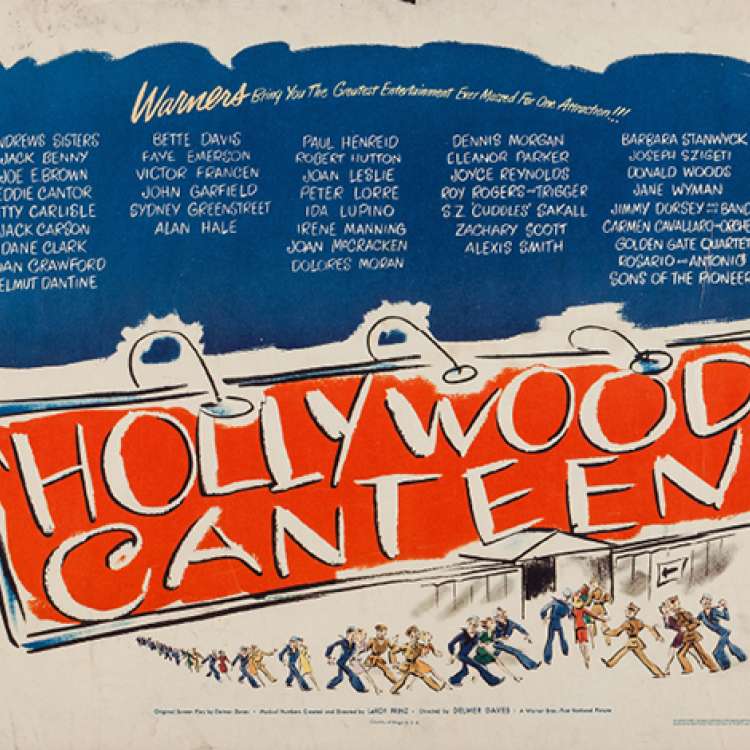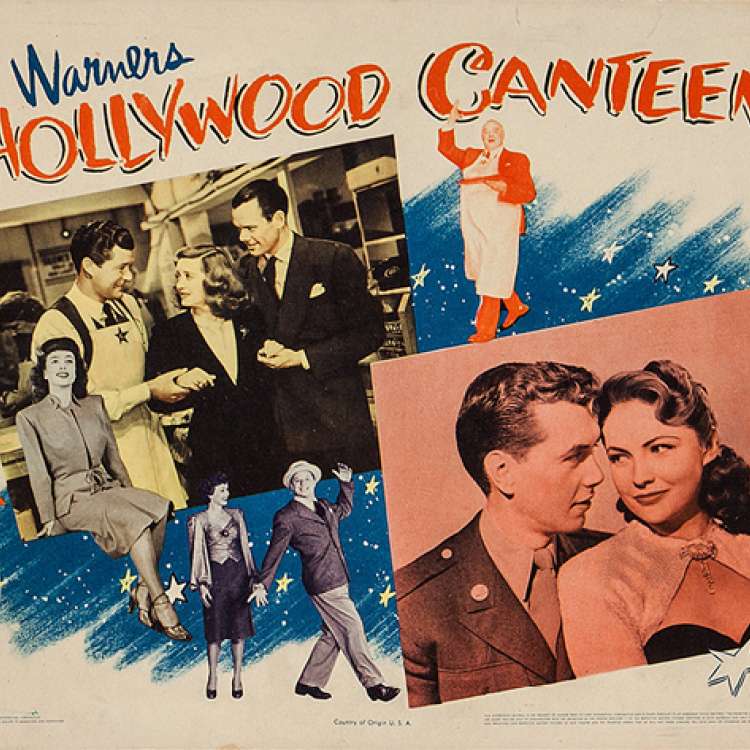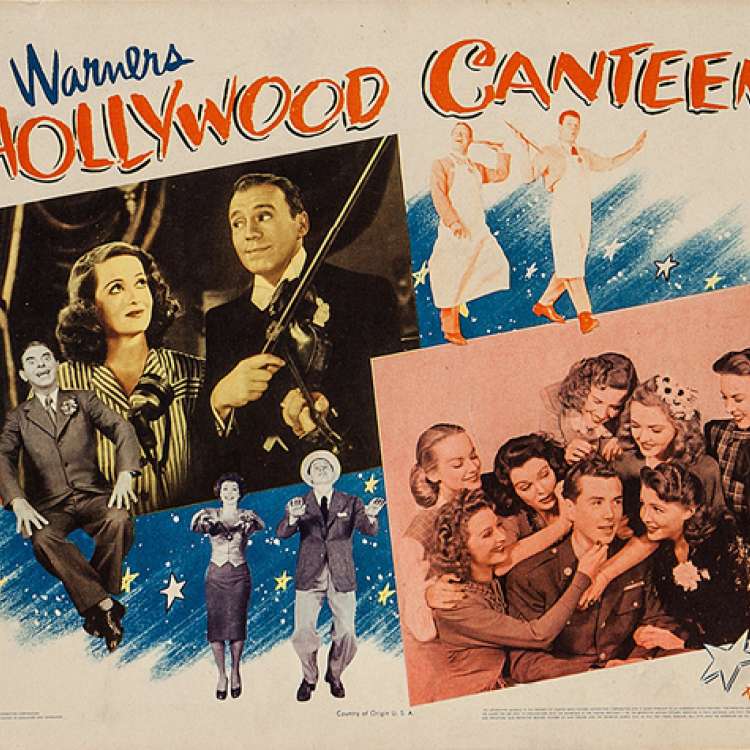Star Givers

As long as there have been celebrities, people who are famous for their abilities to entertain have wanted to show that they contribute more to society than just laughter or excitement or escapism. All of those things are extraordinarily valuable, as much in hard times as in prosperous times, but their value isn’t always appreciated as much as more basic necessities. Showbiz types have been putting their substantial earnings behind charitable ventures since the early days of Hollywood. Oftentimes this happens behind the scenes, with donors who just want to do good, and aren’t concerned about being recognized for it. But more often it happens out in the open, either so that attention-focused famous people can get even more of the validation they crave (if you’re being cynical about it), or so that they can use their celebrity to bring attention to worthy causes (if you’re putting a more positive spin on it).
Take a look back at the 1944 movie Hollywood Canteen for example. It’s a two-hour-plus feature film (which was nominated for three Academy Awards) all about how much help Hollywood is lending to the war effort during World War II. The title location is a real place in Los Angeles, founded by actors Bette Davis and John Garfield, where American servicemen could come while on leave or before shipping out, with free food, drink, and entertainment, provided by a steady stream of celebrity volunteers. The Canteen was a perfect example of charity as performance, providing an important, legitimate, and much-appreciated service for vulnerable people, while also functioning as an ongoing advertisement for its benefactors’ benevolence.
Hollywood Canteen, the movie, is a nonstop parade of famous faces, including Davis, Garfield, Joan Crawford, Jack Benny, Roy Rogers, Barbara Stanwyck, and many more. A New York City counterpart, the Stage Door Canteen, served a similar purpose for military personnel on the opposite coast, staffed by Broadway performers and celebrated in its own eponymous movie in 1943. Proceeds from both films were donated to charities associated with the Canteens. Endorsing specific military campaigns is a bit too complicated and politically risky to unite all of show business these days, but the more generic support of “the troops” is still a very popular way for celebrities across the political spectrum to create feel-good narratives around charitable donations and events.
There are dozens of ways for celebrities to show their support and give back to their communities. Sometimes it happens in quiet, simple ways that fly under the radar: Last year, a social media post about rapper and actor Chris “Ludacris” Bridges paying for a woman’s groceries went viral, prompting a New York Times investigation revealing that Bridges had been paying average people’s grocery bills for years, without starting a high-profile organization or putting on a huge benefit concert or doing anything other than using his wealth to help people in need when he encountered them. Of course, Ludacris also founded his own official charitable organization, the Ludacris Foundation, in 2001, engaging in more formal acts of philanthropy, including economic development and educational outreach.
Sometimes it seems like every even marginal celebrity has a similar foundation, somewhere, to funnel donations that also serves a promotional function, associating the celebrity’s name with every disbursement of funds or success story. Celebrities from Oprah Winfrey to Eva Longoria to Leonardo DiCaprio have their names on foundations that serve a variety of charitable functions. In some cases, celebrity vanity charities become nearly as iconic as their namesakes, with enduring legacies that go beyond movies or music. Legendary actor Paul Newman co-founded the Newman’s Own brand of food products in 1982 with the intention of donating all proceeds to charity, and the company has continued to expand and thrive since Newman’s death in 2008. His face is still on the labels, but plenty of consumers probably have no idea who Newman is. His giving has become the cornerstone of his legacy.
Cycling champion Lance Armstrong may have tarnished his athletic reputation with his use of performance-enhancing drugs, but the charity he founded at the height of his success and popularity, the Livestrong Foundation, has continued to provide benefits and assistance to people struggling with cancer even as Armstrong stepped down from the foundation (which initially bore his name) in 2012. Celebrities’ lives can be messy and chaotic, but a strong charitable organization can continue to do good, even if its main benefactor is no longer beloved or admired (or even famous). People like Ian Somerhalder and Jami Gertz may not be huge names these days, but the organizations they founded (Somerhalder focuses on environmental causes while Gertz and her husband’s Ressler-Gertz Foundation supports a number of charities) keep on providing important services and support.
Sometimes being associated with a charity can backfire on a celebrity, as when musician Wyclef Jean’s foundation for Haitian earthquake victims was shut down over accusations of embezzlement, and Jean, who was born in Haiti, came off like a clueless rich person who cared more about his image than about helping people in need.
Las Vegas has its own strong tradition of celebrity philanthropy, which continues with both visiting headliners and hometown heroes. Aid for AIDS of Nevada (AFAN) celebrated its 33rd annual Black & White Party in August, with local celebrity support from Strip headliners including Tape Face, Murray SawChuck, and Xavier Mortimer, as well as performances by the casts of Vegas shows Magic Mike Live, Human Nature, Legends in Concert and more. AFAN’s annual AIDS Walk had its 29th edition in April, with comedy magicians Penn and Teller serving as the grand marshals for the 18th year in a row and sponsoring their own Penn & Teller Challenge to match any donations above $250.
Celebrities who live and work in Vegas have more obvious connections to local charities, and their involvement often feels more genuine. But even part-time Vegas performers can make a heartfelt impact in town. Lady Gaga has only been a resident headliner for a short time, but she’s demonstrated a commitment to making a difference in town with ventures like her Born This Way Foundation. Even before her show opened at Park MGM, Gaga brought Valley High School into Born This Way’s Mental Health First Aid pilot program, which includes seniors from eight high schools across the country. Once her residency launched, Gaga announced additional programs at Park MGM and partnerships with local schools and nonprofit organizations.
Pop-rock band Imagine Dragons got its start in Las Vegas, and the group’s Tyler Robinson Foundation (TRF, named after a teen cancer patient the band got to know and benefiting pediatric cancer patients) holds its annual Rise Up Gala in Vegas, where the band perfoms alongside other local and national artists. In June, TRF expanded its Vegas presence with the “Battle for Vegas” charity softball game, pitting members of the Vegas Golden Knights NHL team and the Vegas-bound Raiders NFL team against each other. As professional sports continue to grow in Vegas, athletes will be one more class of celebrity who have the motivation to contribute to local charities.
So, when you come across a feel-good puff piece about, say, Taylor Swift donating $113,000 to the Tennessee Equality Project, it may just be a celebrity carefully adjusting their image. It may be a genuine expression of caring for an important cause. More likely, it’s a combination of the two, continuing a tradition that’s been around as long as the cult of celebrity.
If you want to support a local charity, you can find AFAN at afanlv.org, the Tyler Robinson Foundation is at trf.org, and the Born This Way Foundation is at bornthisway.foundation.



